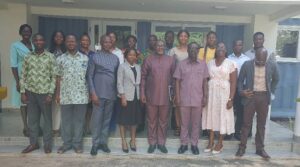
Ghana is in the final stages of adopting a national policy on radioactive waste and spent fuel management after 15 years of its development, as the country positions itself to incorporate nuclear energy into the energy mix by 2030.
The policy, to be finalised next week, will be forwarded to the Attorney-General’s Office for advice, then to the sector Ministry and the Parliamentary Select Committee before its subsequent consideration and passage.
Professor Francis Otoo, the Acting Director General, Nuclear Regulatory Authority (NRA), gave the update to the Ghana News Agency at a stakeholder consultation workshop on Tuesday, which brought together more than 25 sector institutional representatives.
He said efforts were being made to ensure the policy was practical, aligned with international best practices before final adoption, to ensure that during its implementation the people and the environments would be protected.
“One of the requirements for a regulatory body is to get our policies in line with international best practices. International organisations involved in Ghana require local policies to align with global standards,” he said.
Prof Otoo clarified that Ghana currently had radiation sources in mining, oil and gas sectors, and with plans of including nuclear into the country’s energy mix, spent fuel would be generated, therefore, the policy would be critical.
“No company in Ghana owns radiation sources; they are rented and must be returned or safely stored, so the management of such waste, which is being done now by the Ghana Atomic Energy Commission ought to meet international standards,” he said.
“This policy is for workers in Ghana. They should be able to go according to procedures. You shouldn’t be in a situation where NRA will come out with certain policy, which is not practicable, which cannot be used by the workers themselves.”
Mr Kwamena Essilfie Quaison, the Director of Science and Technology at the Ministry of Environment, Science and Technology, described the policy framework as both a regulatory obligation and a moral imperative.
He noted that Ghana’s peaceful application of nuclear science and technology had yielded remarkable benefits across multiple sectors – from cancer diagnosis and treatment to sterilisation processes in industry, agricultural research and future energy aspirations.
“The radioactive waste and spent fuel generated from these applications, if not properly managed, pose significant risks to public health, environmental integrity, and the well-being of future generations,” he stated.
Mr Quaison said the policy was anchored on fundamental principles, including safety first for protection of human health and the environment, security to safeguard radioactive materials from unauthorised access, sustainability, transparency and international alignment with IAEA safety standards.
The policy also provided comprehensive guidance on the entire lifecycle of radioactive waste management, from generation and characterisation, through storage and transportation to final disposal.
Mr Quaison encouraged the participants to engage actively, think beyond institutional interests to national priorities, challenge assumptions where necessary, and propose practical solutions to make the policy document effective.
“We need your candid feedback, your technical insights, your practical experiences, and even your concerns and criticisms. Only through such inclusive dialogue can we develop a policy that is not only technically sound but also socially acceptable, economically viable, and operationally practical,” he stated.
He acknowledged NRA for their technical leadership and government agencies, academic institutions, civil society organisations and development partners for their continued engagement in strengthening Ghana’s nuclear safety infrastructure.
Source: GNA
